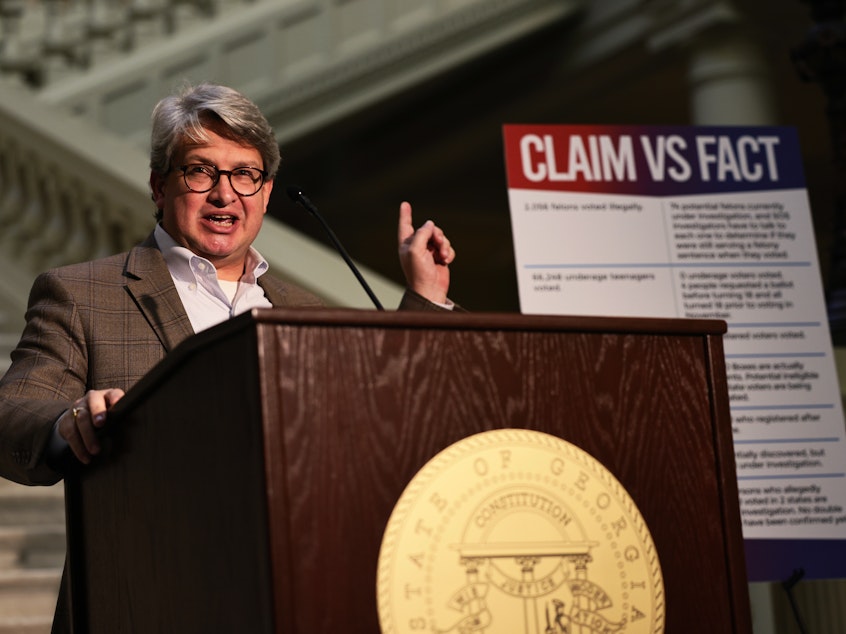Election Officials Warned 'Someone's Going To Get Shot' But That Didn't Stop Trump

Over the four years of Donald Trump's presidency, people in charge of voting in both parties have warned that his continued peddling of falsehoods about elections could one day lead to violence.
Now, as a mob took over the U.S. capitol Wednesday, those predictions have come true.
"Every elected leader who helped spread lies about American elections paved the way to today," said Colorado Secretary of State Jena Griswold.
While many Americans looked at the televisions in shock Wednesday, those in charge of elections seem to have seen it as the natural evolution of a growing problem: a large portion of the country now falsely believes the electoral process is rigged, and therefore there may be no other alternative than taking to the streets.
It's a theme that predated Trump within the Republican party, and one which will probably plague American democracy long after Joe Biden is sworn in on Jan. 20.
A month ago, a top election official in Georgia, Gabriel Sterling, begged his fellow Republicans to stop spreading conspiracy theories about voting, as it was leading to death threats against officials overseeing that state's recount.
"Someone's going to get hurt, someone's going to get shot, someone's going to get killed," Sterling said at the time.
Sponsored
But Trump, and many other Republicans in congress, didn't heed those warnings. In a phone call with Georgia secretary of state Brad Raffensperger over the weekend, Trump listed a number of debunked conspiracy theories, many of which spawned from extremist corners of the internet.
On Wednesday, House Republicans mentioned some of those same conspiracy theories in objecting during the Electoral College vote counting process. And less than two hours later, windows were shattered, at least one person was fatally shot, and the entire building was overrun.
It all could have been avoided, experts say, if those in power told the truth about the legitimacy of the vote.
"WHAT DID THEY THINK WOULD HAPPEN?" tweeted Chris Krebs, a Republican who led the federal government's election security efforts before being fired by Trump in November. "They own this."
Krebs oversaw an effort by Department of Homeland Security to fact-check some of the most pervasive lies about the election over the past two months.
Sponsored
"Yet the President & his campaign/lawyers/supporters fanned the flames for their own selfish reasons," he said.
Trump has given no indication Wednesday's events would change how he talks about the election. He tweeted a video Wednesday evening in which he called the extremists at the Capitol "special" and continued to falsely claim that he was the winner.
The question now is whether congressional Republicans do the same.
Senate Majority leader Mitch McConnell said earlier Wednesday that if elections in the U.S. were overturned by "mere allegations" from the losing side, then "our democracy would enter a death spiral."
"I hope [Republicans] can look themselves in the mirror and say 'was this really worth it,'" said Josh Douglas, an election law professor at the University of Kentucky. "They should have known better. They should have known that they were spouting anti-democracy rhetoric and really undermining one of the core tenets of our democracy." [Copyright 2021 NPR]



